So you’re looking to buy a home safe, are you? Well, allow me to start where no other sane site would start – the truth. Look, a home safe might not exactly offer the Fort Knox style of security that banks and financial institutions offer. As such, it is definitely not the best place to stash your valuable jewellery, priceless art, rare coins, and other unspeakable treasures. That said, you still can’t keep going to the bank safety deposit box every time you want to wear a necklace or a fancy watch.
If what you really want is to safeguard your weapons, electronics, accessories and hard-to-replace items such as passports, tax records, and other sensitive documents while also keeping them close at hand, then nothing works better than a home safe. Not only are they reliable enough to keep your items safe in the event of a disaster, but a good safe is a valuable theft deterrent. I can see that you’ve already made up your mind about getting your own unit.
If you’ve been looking around, then you’ve no doubt realized that there’s a lot more that goes into buying a home safe than you previously thought. Home safes are used to keep your documents, valuables, weapons, and other precious items; the last thing you want is to be duped into buying something with less security than a thin metal box. Lucky for you, we’ve done and done all the grunt work to find some of the most solid, convenient, innovative, easy to use, and most recommended home safes in the UK.
Best home safe reviews
1: OUR TOP PICK – Yale YSM/250/EG1 Certified Home Safe
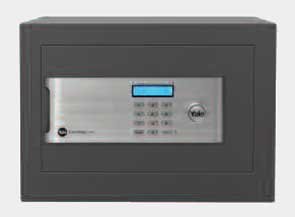 If you’ve never heard of Yale, then you’ve been living under a rock my friend. Introducing the inventor and patent owner of the very first tumbler lock, Yale is hands down one of the leading lock brands on the planet. Their newest release dubbed the Yale YSM/250/EG1 Certified Home Safe is definitely proof of that.
If you’ve never heard of Yale, then you’ve been living under a rock my friend. Introducing the inventor and patent owner of the very first tumbler lock, Yale is hands down one of the leading lock brands on the planet. Their newest release dubbed the Yale YSM/250/EG1 Certified Home Safe is definitely proof of that.
The YSM 250 leads the new collection of home safes built to be more reliable, robust, thicker and much easier to use. The exterior comprises of an extra thick body measuring 3mm and an even thicker door at 8mm of hardened steel. This is further reinforced by 22mm motorized locking bolts and six double bitted mechanism override locks. Throw a digital keypad with over 100,000 possible combinations in the mix, and it’s easy to see why the YSM remains one of the toughest nuts to crack. As for comfort and convenience, that’s covered by the auto-opening function and 3 LEDs on the inside to see what you’re doing.
2: Firestar Home Safe
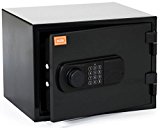 While most home safes protect your documents and valuables from theft, they’re pretty much useless in the event of a disaster. The absolute last thing you want is for a fire to claim everything you’ve managed to keep safe for years. This is where the Firestar Home Safe literally throws itself in the line of fire.
While most home safes protect your documents and valuables from theft, they’re pretty much useless in the event of a disaster. The absolute last thing you want is for a fire to claim everything you’ve managed to keep safe for years. This is where the Firestar Home Safe literally throws itself in the line of fire.
Introducing the pride and joy of Firesafe’s multi purpose fire and security safes, this electronic fireproof safe is the ideal match for both homes and workplaces. These safes are constructed using galvanized steel to meet exacting standards and include a fire resistant barrier that is built in all around the safe walls. Each safe is tested and certified to provide up to an hour of fire protection for documents. What’s more, it is rated with a cash cover of between £2,000 with a valuables rating of £20,000 for insurance purposes.
3: ROTTNER Sydney40 Fire Safe – Heavy Duty Double-Walled
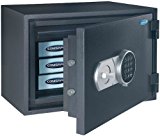 If you’re looking for the ultimate protection with strong armour, and protection from the elements, then I’m pleased to say that your search ends here. The ROTTNER Sydney40 Fire Safe is among one of the most sturdy and robust units in the UK. Wait until you get a gander of what this Fire safe is capable of.
If you’re looking for the ultimate protection with strong armour, and protection from the elements, then I’m pleased to say that your search ends here. The ROTTNER Sydney40 Fire Safe is among one of the most sturdy and robust units in the UK. Wait until you get a gander of what this Fire safe is capable of.
Constructed entirely from extra-thick, double walled steel, this bad boy is as heavy duty as they come. But that’s not the best part; Rotter went ahead and packed fire resistant concrete all within the walls. So not only is the Sydney-40 capable of withstanding hours of physical abuse, but it can also resist extreme fires for up to 60 minutes. It’s also fitted with the latest LCD digital lock that works in tandem with twin metal bolts. With over a hundred million different code possibilities and double bolt locking mechanisms, It’s safe to say no one’s getting in there but you.
4: Phoenix Titan Fire Security Safe
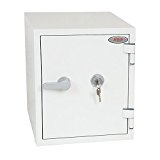 It’s nice to know that even with all the technology in the world, we can still rely on good old keys. Our next safe is an original little model that manages to combine all the modern features of today’s home safes with some of the most reliable locking mechanisms of all time.
It’s nice to know that even with all the technology in the world, we can still rely on good old keys. Our next safe is an original little model that manages to combine all the modern features of today’s home safes with some of the most reliable locking mechanisms of all time.
Introducing a much-welcomed release from one of the oldest UK safe and security product manufacturers, the Phoenix Titan Fire Security Safe is a beautiful, modern and compact home safe with more than its fair share of protective features. These include International NT Fire 017 testing that guarantees every safe is capable of withstanding 60 minutes of extreme fire and heat. The safe is also recommended for an overnight cash risk of £2,000 or £20,000 for valuables. But the most interesting part has to be the old-school style high-quality key lock that ensures anyone without a key won’t get in. The Titan’s simplicity means you don’t need any power source for any digital features – just good old, reliable keys anytime.
Key things to consider when buying a home safe
Home safes – they’re a once in a life time purchase, will never go out of fashion and don’t have a use by date. That’s why every home owner needs to take extra special care when buying one. But before you go spending your hard earned pounds, how about a quick glance at all the factors to consider when purchasing a home safe?
1: Protection: Pick your perils
This is without question the most important factor to consider when you’re out looking for a home safe. Think about it; doesn’t it beat logic if you get a safe that can’t keep your items safe? Most home safes are engineered to protect your items from 3 main elements. These include fire, water, or theft. So when you’re buying a safe, you should consider which of these perils pose the biggest threat and what levels of protection you want.
Fire resistance
Whether you live in the UK or any other part of the world, fire is the number one concern for most home owners. According to research, every home faces a one in four chance of experiencing a household fire; and that’s just one that’s serious enough to warrant a visit from the fire department. That’s why fire resistance should be your first priority in a home safe.
Fireproof safes are usually rated for temperature as well as protection time. If you want to protect paper documents from fire, then you’ll need a safe that won’t exceed 350 degrees internally. DVDs, electronics, and computer disks are more sensitive and will require a safe that won’t exceed 125 degrees.
Burglar protection
Burglary and theft are the second most common peril for many home owners. To determine burglary ratings, safe companies go at their units with tools, torches and even explosives. A TL-15 rated safes can withstand at least 15 minutes of attack with common tools. And while not all home safes carry burglary resistance ratings, they provide some form of protection. Combine that with the simple fact that some of these safes can be mounted on a wall or concealed and you have enough of a theft deterrent.
Water resistance
More often than not, protection against water tends to be an added feature on top of fire and theft protection. Safe manufacturers use lasers to reduce gaps between doors and walls and dunk their safes underwater to simulate floods. This feature is especially useful for people in flood prone areas.
2: Lock style: Consider your locking options
Apart from choosing a home safe that is big and tough, it’s worth considering what options you have for locking. Locks act as your secondary line of defence and depending on the method you choose; it will have an effect on security, convenience, and price. You could always go for basic locking methods such as simple key and lock. But there are also other options such as mechanical locks, biometric systems, and electronic interfaces.
Mechanical locks are those you see in movies with a numbered dial that spins. They’ve been used for centuries, and they do offer decent levels of protection. However, turning the fiddly dial becomes a chore if you open your safe multiple times a day. Electronic locks, on the other hand, use sophisticated locks with less moving parts and a simple numbered code to open. But while electronic locks offer incredible variety and convenience, they can be bounced open by well-equipped burglars.
The cutting edge of safe locking has to be biometric locks. These work by utilizing electronic systems that can interact with some aspect of the user’s body such as retinal scan or fingerprint technology. Sure, biometric safes may have been a bit dubious and unreliable in the past, but all that’s changed today. The main advantage of this type of lock is that there’s no code to remember and only the correct user can get the safe open.
3: Size: Think about tomorrow
Here’s another factor that can render your safe completely useless if you get it wrong. As a rule of thumb, always buy the biggest safe you can afford. Not only does this give you more value for your money, but it also covers future items. After all, you can’t expand a home safe now, can you?
According to a recent survey of home safe owners in the UK, their biggest regret was not buying a bigger safe. To get a better idea of how big your safe should be, gather all the items you intend to put in your safe and see how much space they take up. If you find that they only take up one cubic foot, then that should be your gauge for a minimum safe sizing. However, the best move would be getting a home safe that is twice that volume to accommodate future documents, gadgets, electronics, and other items.
4: Budget: Go all out
I’ll give it to you straight; it’s either you buy an excellent safe or you don’t get one at all. A cheap home safe is no better than a fancy tin box with a padlock. With safes, you want to go with the most protection you can afford without breaking your bank. But don’t go for something cheap, otherwise, it’s someone else who will break and raid your bank.
Home safes should be seen as an investment that will help protect all your other investments and valuable items. This is one investment that you will be using for years to come, even after most of the items you’re protecting have already lost their value. So make sure you choose a robust, high-quality safe that will get the job done. But if you’re working or a really tight budget, it’s better to go for some of the pocket-friendly options from well-known brands such as Yale or Phoenix.
5: Portability: Move much?
Typically, home safes come in three primary degrees of portability. These include free, portable units, wall mounted safes, and those of an anchored variety. However, you don’t have to be a rocket scientist to know that a portable safe is literally the definition of an oxymoron. Security experts strongly caution against portable safes because that makes them more susceptible to theft. So not only will burglars take everything in your safe, they’ll also take the whole goddamned thing too.
The best types of safes are wall mounted and anchored for maximum security. Sure, this makes them permanent, but that’s the main idea guys. So even if your safe is concealed, you still need to anchor it in case burglars discover it. Anchoring your safe to concrete or wooden sub floors provides adequate protection and extra security precautions that could mean the difference between an easy score and a frustrated burglar.
Frequently asked questions
Where is the best place to hide a home safe?
Look for a hidden place that’s not obvious to a burglar. Some good locations include inside a wall cavity, under the floor boards, under a stair tread or behind a stair riser (for small safes), or somewhere in the basement.
What can I keep in a home safe?
The best things to keep in a home safe are valuables that you want easy access to. Things like money, your passport and other important documents, jewellery and weapons.
We don’t recommend keeping large amounts of money and extremely valuable or sensitive items in a home safe. It won’t offer the same security as a bank safe deposit box.
How do I install a safe at home?
Once you determine the best location to keep the safe, secure it to the floor or wall. Most home safes come with all the fixings you need to mount the safe on the wall or bolt it to the floor.
If you plan to hide the safe within a wall cavity, you’ll have to cut into the plasterboard, saw off wall studs to create the right size cavity and construct a frame to support the safe. If you have a brick or masonry wall, get a pro to help you install the safe.
Are home safes secure?
It depends on the quality of the safe you buy. Look for a certified safe with thick metal walls, a secure locking system and water & fire protection. And don’t forget to bolt the safe to the floor or walls.
Final word
There you have it folks, everything you need to know about buying home safes right at your fingertips. Getting your perfect security unit should be much easier thanks to this comprehensive home safe buying guide. But before you sign out, there’s just one more thing I have to share with you. Always remember that loose lips can sink ships.
Many burglaries actually happen because someone in the family couldn’t keep their mouth shut about the location of the safe or worse, what’s in it. So as fun and exciting as it might be owning a brand new safe, try not to openly talk about it even if you are confident in its protective abilities. So go ye unto the world and buy your very own home safe, (and don’t forget to not tell us all about it).
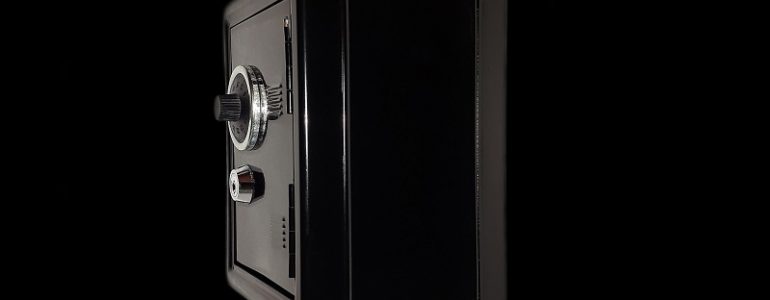




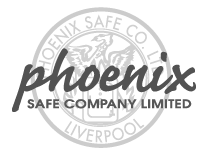


Where can I get a safe key for a black spur ES 100 safe